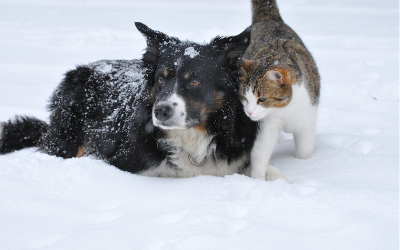
While lots of things in life are unpredictable, there’s one thing that we can count on in many parts of North America this winter – snow and freezing temperatures! Winter is a great time to get out and exercise with your pet, but some precautions should be taken before heading out in the winter wonderland.
Here are a few essential tips to make sure your pets stay protected and safe this winter:
Paw Patrol
To help protect dog paws, booties are available in pet stores and online. Booties help keep your dog’s paws warm and dry and prevent salt and other harsh chemicals from contacting your pet’s paws. Getting the right fit can be a challenge, so it may be a good idea to take your dog into the pet store to try them on. Make sure they stay on your dog’s feet while he’s walking but aren’t too much of a challenge to get on and off – if you both get stressed trying to put the booties on, it’s unlikely that you will use them.
If your dog refuses to walk with booties on (we’ve all seen those videos on social media!), there are other options you can try. Protective balms, much like lip balm, help protect your dog’s delicate pads from icy, salt-covered sidewalks and roads. To help prevent irritation, apply a thin layer of the balm before you head out and wipe any residue off upon your return. Also, be sure to maintain good foot grooming. Long hair between your dog’s pads can encourage ice balls to form between and around the pads. Keep the hair on your dog’s feet trimmed and enlist the help of a groomer if you don’t feel comfortable trimming his feet.
Winter Toxins
Avoid the use of toxic or harsh deicers on your property and try to avoid heavily salted areas while out for walks. While more people are using pet-friendly deicers in winter, roads and sidewalks are usually heavily salted. Some dogs will ingest salt as they walk, and others will lick their paws to remove irritating salt from their pads. Wash or wipe your dog’s feet with warm water or a warm, wet cloth to remove chemicals.
Be sure to wipe up antifreeze and winter windshield washer spills from your driveway, as both contain ethylene glycol – a deadly poison for cats and dogs. It only takes a small amount to cause permanent and fatal kidney damage. When using chemical deicers on your walkways, driveway, or anywhere else around your home, read the product label carefully and follow all precautions.
Winter Sweaters and Time Limits Outside
Some dogs, like Siberian Huskies, are built for the cold, but others need an extra layer to help keep them warm on cold winter days. If not “dressed” for the cold, prolonged exposure to wind chill and cold temperatures can cause frostbite and hypothermia in both cats and dogs. Young animals, seniors, and dogs with a short haircoat (or a bare tummy) are most affected by cold temperatures. There are lots of options for keeping your dog warm this winter including coats, sweaters, sweat suits, and hats. Measure your dog carefully to be sure you’re getting the right size or ask for assistance from pet store staff. Limit the time your cat spends outside on cold days or keep her inside despite her calls to go out. On extremely cold days, shorten your walks and outdoor play time, and pay attention to your dog’s behavior – if he’s shivering or crying, it’s time to head inside to warm up.
Winter can truly be a wonderland for you and your pet! Prepare for the cold and take some precautions for a pet-safe winter!